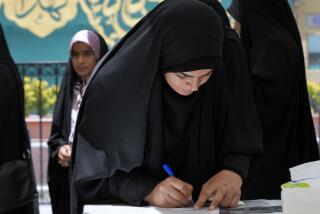Iran backs Iraq’s effort to form unity government, diplomats say
Reporting from Washington — Iran is tacitly supporting Iraqi officials’ efforts to form a government in Baghdad that includes the country’s three main ethnic and religious groups, according to Iraqi and Western diplomats, an encouraging sign for U.S. efforts to forge a regional coalition against Islamic State militants.
With strong influence in Baghdad, Tehran could have pushed the new prime minister, Haider Abadi, to install Shiite Muslim allies in key positions to maintain the same level of Shiite control imposed under his predecessor, Nouri Maliki.
Instead, Iranian officials stood aside as Abadi named some Sunni Arab Muslims and ethnic Kurds, as well as Shiite Muslims, to high posts in a government that will seek to mobilize against Sunni extremists who swept out of neighboring Syria last year and now control about one-third of Iraq.
“Iran recognizes that [Islamic State] is a threat to them, and that it’s in their interest to have a unified government that can push back against the havoc,” said Karwan Zebari, director of the Kurdish regional government’s office in Washington.
Iran and the United States waged a bitter proxy conflict for control of Iraq after the 2003 U.S.-led invasion, and many experts doubted they could work together against the Islamic State militants.
Yet the two governments have worked on parallel military tracks over the last month to help Kurdish and Iraqi security forces halt and, aided by scores of U.S. airstrikes, begin to roll back the militants’ hold on territory and infrastructure across northern and western Iraq.
The State Department has acknowledged multiple high-level contacts between U.S. and Iranian diplomats as the threat has grown, including a meeting last week between senior U.S. and Iranian officials on the sidelines of negotiations over Iran’s disputed nuclear program.
Secretary of State John F. Kerry flew to Baghdad early Wednesday for the first of several stops in the Middle East to try to build a coalition against the militants. He praised Abadi’s efforts to form a broad-based government as “a milestone.”
The White House this summer urged Maliki to resign and said the U.S. could not expand its military campaign against the militants unless a new government in Baghdad could operate as a partner in the fight. Iran’s support for Abadi now makes that possible.
Hard-liners in Tehran at first resisted efforts to oust Maliki, who had marginalized the country’s Sunni minority and ordered harsh security measures in Sunni communities. But others in Iran, including President Hassan Rouhani, concluded that Maliki’s tactics had helped create Sunni support for the insurgents, and thus had worked against Iran’s interests.
A turning point came in June when Iraq’s senior Shiite leader, Grand Ayatollah Ali Sistani, indicated that he wanted more inclusive leadership. Iranian leaders “did not want to be seen opposing the ayatollah,” said an Iraqi official.
It remains unclear how broad the Iraqi government will be. The powerful posts of defense and interior minister remained unfilled Wednesday, and many of Abadi’s appointees are seen as retreads from previous Shiite-controlled governments.
Abadi has kept out one figure whom hard-line Iranians would like to see in power: Hadi Amiri, who has close ties to the elite Iranian Revolutionary Guard, and has been promoted by some Shiites for the interior minister post.
Many diplomats and analysts worry that the cooperation demonstrated in Iraq this week may not last.
Iran is deeply suspicious of the renewed U.S. presence, and officials in Tehran are likely to become more uneasy as the American intervention grows.
“Pretty soon they may see us again as the biggest threat,” said James Jeffrey, who served as U.S. ambassador to Iraq from 2010 to 2012.
Qassem Suleimani, head of the Revolutionary Guard’s Quds Force who has reportedly been supervising Iranian military operations in Iraq, “is in no way interested in any regular, or even any irregular, cooperation with us,” said Ryan Crocker, who served as U.S. ambassador to Iraq from 2007 to 2009.
Iran’s attitude could change abruptly because of the continuing struggle in Tehran between hard-liners and reformists, he said.
Iran has sent Quds Force personnel, manned aircraft and drones to Iraq to help protect Shiite areas and shrines, and to help Kurdish and militia forces, say U.S. officials and experts. Officials in Tehran insist that they would never join forces with Washington.
U.S. officials deny that they are actively cooperating with Iran on the military front or sharing intelligence. A senior Obama administration official said the two governments are communicating but are not working together.
Yet U.S. and Iranian personnel have worked in close proximity in the semiautonomous region of Kurdistan in northern Iraq, analysts say.
U.S. officials won’t outline their discussions with Iran about the conflict in Iraq. One official said the U.S. diplomats describe, in a general way, U.S. goals and plans there.
That’s intended, experts say, to avoid an accidental collision between their forces, and perhaps also to reassure Tehran that Washington doesn’t intend to send combat troops back to Iraq.
Jeffrey said U.S. officials may also be warning Iran not to expand its own forces in Iraq because they could alarm Turkey, Iraqi Sunnis and Sunni Arab states in the region, undermining the effort to build a coalition against Islamic State.
“If they do that, whatever halfhearted cooperation we’ve motivated will be gone,” he said.
Times staff writer Richter reported from Washington and special correspondent Mostaghim from Tehran.
More to Read
Sign up for Essential California
The most important California stories and recommendations in your inbox every morning.
You may occasionally receive promotional content from the Los Angeles Times.











